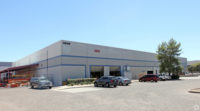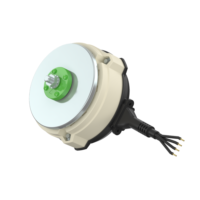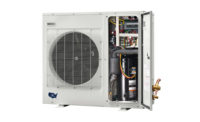For Hensley Beverage Company, one of the largest beverage distributors in the U.S., it is crucial to stay ahead of the curve on everything that drives customer satisfaction, corporate responsibility and a strong bottom line. They collaborated with Chemours and American Refrigeration Supplies, Inc. (ARS) to implement a system utilizing a new-generation A2L refrigerant, Chemours Opteon XL20 (R-454C).
Completed in 2023, the installation paves the way for companies throughout the commercial refrigeration industry to embrace refrigerant technologies that are both cost-effective and environmentally sustainable.
The Phoenix-based beverage wholesaler supports a customer base of more than 9,000 accounts and more than 2,500 individual products, operating out of six locations across Arizona. Hensley recently completed an acquisition that expanded its distribution footprint into New Mexico, making it one of the largest family-owned and operated beverage distributors in the nation. As it grows, the company remains committed to maintaining exceptional product integrity, upholding its multi-generational family business legacy, and supporting a variety of environmental objectives.
“Hensley was an early adopter of Opteon XP40, retrofitting equipment to experience better environmental outcomes, as well as high performance in low- and medium-temperature applications. Experiencing these benefits of HFOs whet their appetite to ask, ‘What next?’” said Joe Martinko, president, Thermal and Specialized Solutions at Chemours. “With strong dedication to supporting their communities and the environment while operating an efficient and thriving business, Hensley is a company that pushes the envelope. Chemours was ready with our next-generation Opteon XL20—that will ensure they achieve maximum performance, operating efficiency, and sustainability.”
These factors, coupled with the current regulatory landscape (notably, the phasedown of legacy hydrofluorocarbon (HFC) refrigerants), put Hensley’s focus on ways to upgrade its refrigeration systems.
For the past several years, Chemours, ARS and Hensley have worked together to retrofit the distributor’s existing R-22 and R-404A systems to Opteon XP40 (R-449A), a hydrofluoroolefin (HFO) blend offering zero ozone depletion potential (ODP) and a significantly lower global warming potential (GWP) than legacy products. However, with the ongoing phasedown of HFC refrigerants under the U.S. EPA’s American Innovation and Manufacturing Act (AIM), the teams began weighing the benefits of an even bolder upgrade.
Solution
Even as Chemours, ARS and Hensley continued strategically retrofitting solutions in some areas, they explored options that would put the company in a stronger position for the long term. Chemours recommended bringing Opteon XL20 (R-454C) into Hensley’s refrigeration plan. A mildly flammable refrigerant with an ASHRAE A2L safety classification, Opteon XL20 is designed for use in new equipment, so Hensley identified an old R-22 system near the end of its life that was ideal for replacement by a new system using Opteon.
Opteon XL20 has been used for several years in Europe and is expected to become the new norm in the U.S. by 2026, based on the current direction provided by the EPA. Leveraging its experience in Europe, the Chemours team of technical service and business development resources is prepared to support end users as they consider trial installations using A2L refrigerants.
Collaboration and Installation
The installation brought together additional resources from the HVACR industry, including Copeland and Heatcraft Refrigeration Products— two ARS manufacturing partners—as well as Technical Building Services, Inc. (TBSI), the local HVACR service provider. As global HVACR technology leaders helping customers achieve their sustainability, decarbonization, and regulatory compliance goals, Heatcraft and Copeland had the knowledge and experience of emerging A2L requirements and the capabilities to support the project. TBSI was selected as the contractor for installation and servicing.
With the team assembled, Chemours took the lead on the project, ensuring that the contractor, Hensley’s service personnel, and others involved were certified through the ESCO Institute’s A2L refrigerant training program, and answering any questions from the local authorities. After safely recovering the R-22 for use in other Hensley systems, the team from TBSI started removing the existing Keg 6 equipment, hanging new evaporator coils and running new refrigerant lines. Installation, evacuation and charging procedures were very similar to the current refrigerants in use by industry, making for a time- and cost-efficient process.
“Hensley Beverage is proud to partner with Chemours, TBSI, and ARS to help develop innovative solutions and responsible business practices that drive sustainability in our community,” said Alex Dunn, SVP of Operations at Hensley Beverage. “The groundbreaking results are a culmination of partnership and collaboration. It is refreshing to work with three organizations that are this passionate about developing pioneering products that will help shape a better future for the communities we serve.”
Summary
Influenced by upcoming regulatory changes and stronger organizational ESG commitments, the commercial refrigeration industry’s transition to lower GWP refrigerants is inevitable.
Opteon refrigerants provide organizations with lower GWP options that can help extend the useful life of their systems, as well as new equipment options that enable decades of reliable operation. Moreover, these systems answer the consumer preference for businesses that utilize responsibly manufactured products and support a greener environment.
Hensley’s approach demonstrates an ideal way for companies to meet the needs of refrigerating their products while following guidelines of the HFC phasedown. It is important to assess where your equipment is in its lifecycle and determine if it makes the most sense in terms of budget, performance needs, and corporate vision to retrofit existing equipment for more efficient and sustainable operation or replace it with A2L refrigerant technologies and products.





